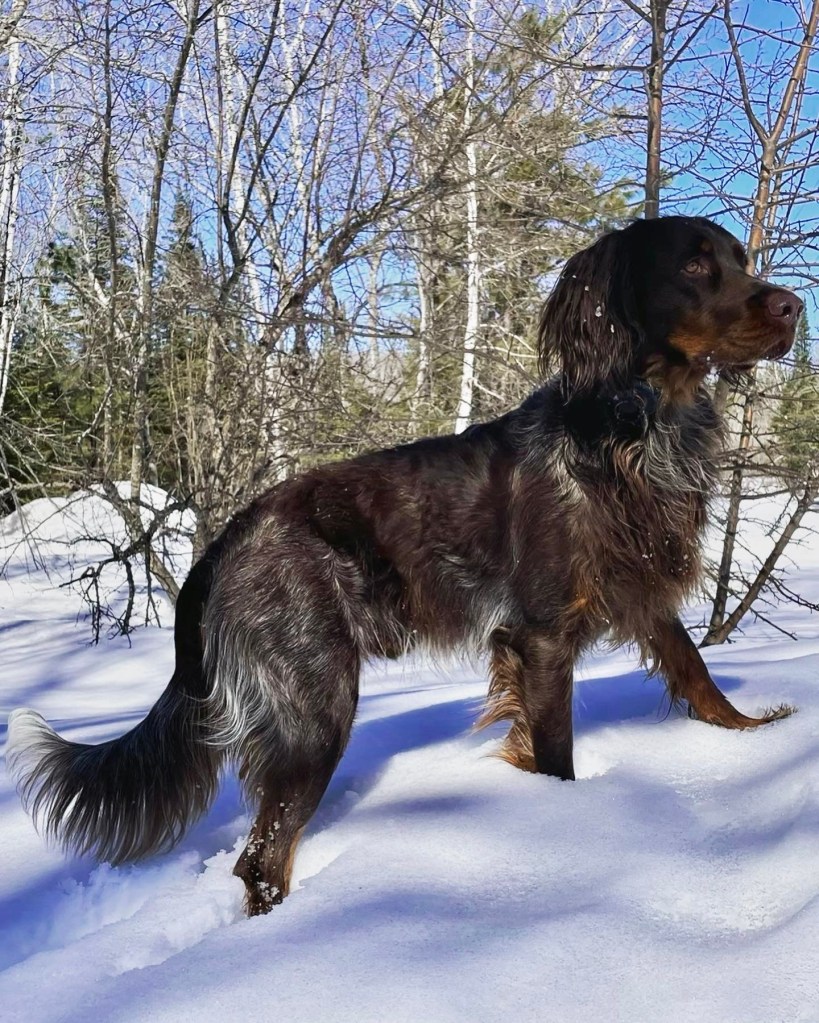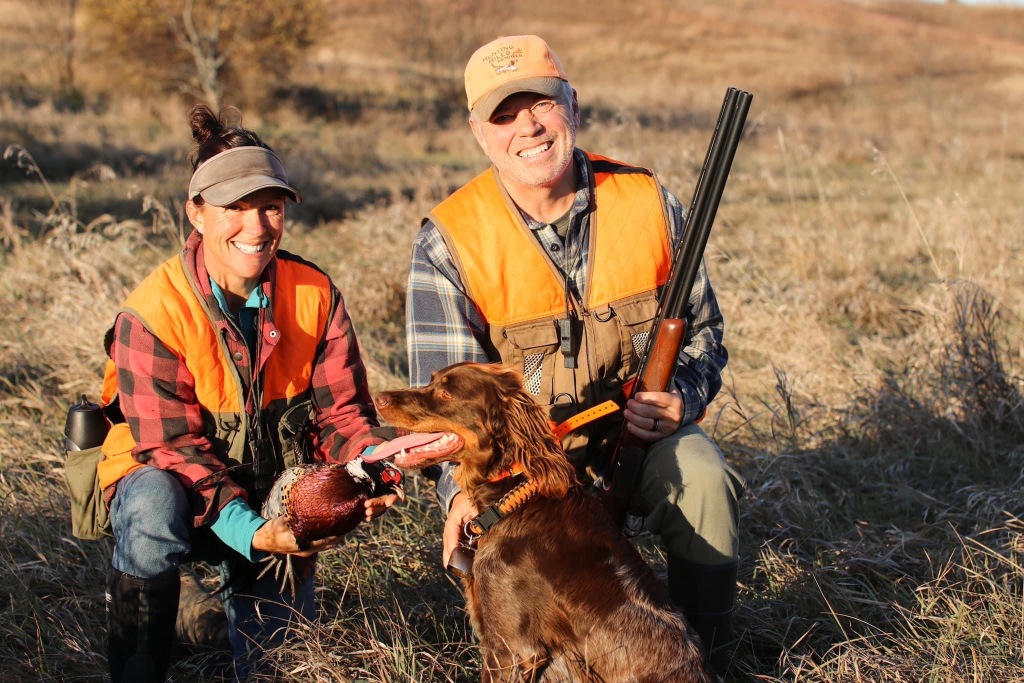Picardy Spaniels are true versatile hunting dogs: solid pointers and natural retrievers that will hunt every type of game. This repost provides some advice about different breeds whose predominant characteristics are wrapped up into every Picardy Spaniel. There are different thoughts about hunting your young dog alone or with a more experienced dog during his/her first season. This question is addressed in the repost below by breeders and hunters of pointers, retrievers and spaniels. Their perspectives below are also full of excellent advice and common themes about hunting your young dog…

The First Hunt: Alone or With an Experienced Dog
Compiled by James Spencer. First posted on 23Sep10 in GunDog
Pointing Breeds: by Cap Anderson of Hunt ‘Em Up Kennels
Releasing a young dog for his first wild bird hunt will give you one of hunting’s greatest pleasures. However, you should hunt him alone, not with other dogs, for at least his first several trips. That way you and he will be more able to set your own pace. More importantly, you can learn to read each other. A young dog can learn valuable lessons from an older, more experienced dog, but he can also learn some less-than-valuable lessons.
Never take a first-year dog out with a large group of hunters. Take one other person, but only one person per outing on first year hunts. You can take turns shooting, but you should shoot only once or twice per bird, and only shoot at birds your dog has pointed. Too many shooters, all shooting at one bird can make a young dog gun-shy, even if the youngster has been thoroughly gun-proofed.
Don’t hunt your young pointing dog with a flusher. If they get too close to one another, the flusher will flush birds that your dog has pointed. It doesn’t take much of that to turn your young pointing dog into a flusher.
Don’t overwork your young dog. Hunt him for a couple of hours, or even less if he shows signs of tiring or getting hot. Then water your dog and rest awhile.
Before taking your dog on his first hunts, work him until he’s really sharp on all obedience/control commands. And wait until after you’ve hunted your dog alone often enough to be able to read and control him/her before hunting with another dog. Even then, you should hunt him with only one other dog, and that dog should also be well-trained. When hunting two dogs together, you and your buddy need absolute control over both dogs.
Retrievers: by John Dahl of Oak Hill Kennel
During your retriever’s first hunting season you should not hunt him with another dog. To hunt two dogs together requires extensive training for both dogs. The typical first-year hunter simply hasn’t had enough of that training. I prefer never to hunt more than one retriever at a time. Two is a liability. Three is a disaster. Hunting with multiple retrievers is more stressful, less enjoyable, and no more productive than hunts with just one dog.
During your retriever’s first season you should take one hunting buddy along. Let him do the shooting while you concentrate on your dog’s work. Your hunting buddy should be a good shot and should be careful to keep the muzzle blast from his shotgun away from your dog’s head. Five hunters suddenly firing 15 magnum rounds near a sleeping dog can provoke a fearful reaction.
Be careful not to over-work your young dog. When he shows signs of tiring, you give him a drink and put him up for a rest until he recovers. In warm weather watch for overheating, which can be life-threatening and requires immediate action. Symptoms of over-heating include rapid panting, the tongue rolling out of the side of your dog’s mouth, glazed eyes, and pale gums. If they do occur cool your dog as best you can and then run, don’t walk, to the nearest veterinarian. Heat strokes can be fatal.
During that first season, forget about filling your gamebag. Be reasonable, and don’t expect miracles during your retriever’s first hunting season. Since you cannot fully simulate hunting in training sessions, your young dog’s first few hunts are critical learning opportunities. Your retriever is a novice needing help. Forgive his mistakes and encourage good habits.
Spaniels: by Morgan Haglin of Pine Shadows Kennel
During your young spaniel’s first hunting season you can hunt him alone or with other dogs. It’s your choice — just be aware that your young dog can learn both good and bad habits from older dogs. An older dog can teach a young dog how to pace himself. On the other hand, an older dog can teach a youngster to range out too far. He might also steal retrieves from the youngster.
You can comfortably take a couple of buddies along during your spaniel’s first hunting season, provided they are aware of your dog’s skills and will follow your instructions. Only hunt with people you know and trust. If your puppy has been properly gun-proofed in training, a couple of additional shooters won’t disturb him while hunting. That said, avoid really large hunting parties, all emptying their guns at the same at one or two flushed birds. This can really unnerve even the most thoroughly gun-proofed young dog.
Avoid over-working your young dog and stop for a rest whenever you notice that he is slowing down a bit. You should stop and give your dog a rest whenever you find yourself becoming tired. After all, your dog is covering many times as much ground as you are in every field. Remember that it’s hotter for him down in the cover than it is for you walking upright behind him. If your dog starts panting heavily, you should stop, give him a drink, and let him rest in the shade until he snaps back again.
Always have a first-aid kit in your vehicle and make sure you know how to use everything it contains. Otherwise, it won’t do you much good when you need it. You should also always have a local vet’s phone number.
I favor hunting a young spaniel with older, more experienced dogs. But, when hunting with dogs belonging to others, you should focus entirely on your own dog’s work. Don’t worry about what the other dogs are doing.
Click here to read the entire post: Your Dog’s First Season – Gun Dog (gundogmag.com)
Reposted by Castiron Kennels
Ric, Ellen of Castiron Kennels and their 4 Picardy Spaniels live in New Glarus, WI just 25 minutes southwest of Madison. A lifelong hunter, Ric has trained and hunted Small Munsterlanders, Gordon Setters, and for the past 7 years Picardy Spaniels. Ellen has an extensive background in animal genetics and a PhD in Reproductive Physiology. She bred and trained Greater Swiss Mountain Dogs prior to Picardy Spaniels.
